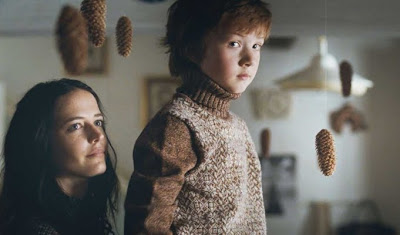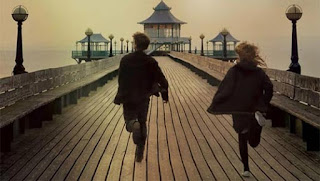Disney’s A Christmas Carol (2009) [Blu-ray + DVD] + The Fourth Kind (2009)
DISNEY'S A CHRISTMAS CAROL
**½/**** Image A- Sound A Extras B
screenplay by Robert Zemeckis, based on the novel by Charles Dickens
directed by Robert Zemeckis
THE FOURTH KIND
ZERO STARS/****
starring Milla Jovovich, Will Patton, Corey Johnson, Elias Koteas
written and directed by Olatunde Osunsanmi
by Ian Pugh If Robert Zemeckis hasn't quite left the Uncanny Valley behind, at the very least, the heart missing from his latest effort–what seems like the trillionth retelling of Charles Dickens's A Christmas Carol, and the billionth animated one–correlates directly to its absence of personality, rather than to an absence of humanity. A backhanded compliment, to be sure, but the character designs finally resemble something closer to artistic interpretation than to a failed attempt at replicating human beings exactly as they are, with Marley (Gary Oldman) and Scrooge (Jim Carrey), for example, rendered almost expressionistically to evoke rotten apples and hunched skeletons. From that standpoint, the actors' sudden bursts of acrobatic grace, no longer so incongruous, capture some of computer-animated cinema's wonder, the kind at which Zemeckis has grasped since The Polar Express–a true example of bringing the impossible to life. The only problem is that Zemeckis's own script isn't worth more than a shrug, and the film relies too much on its visuals to carry the extra weight.

 by Walter Chaw
by Walter Chaw by Bill Chambers I found the imposed misery of Never Let Me Go a lot less provocative and haunting than the self-inflicted kind one encounters in Benedek Fliegauf’s Womb, whose one-word title seems to not-unduly affiliate the picture with Jonathan Glazer’s great Birth. I love this movie, but it took me a few days to digest it, and I’m not sure I’d have the patience to sit through it again. It’s challenging from the get-go, what with the quasi-kiddie porn of its opening sequences, in which a beautiful young boy and girl start sleeping together, and the girl caresses her skin, then the boy’s, as if trying to decipher some message between them written in Braille. (For pure eroticism, though, nothing trumps the pair watching a snail writhe across a kitchen table–and it’s here that I wish I possessed Walter Chaw’s vocabulary for discussing suggestively Romantic images such as these.) The girl, Rebecca, moves to Tokyo, and grows up to be played by Eva Green. She returns to the little beach community where she met the boy, Thomas (Matt “Doctor Who” Smith as an adult), and looks him up, having transparently spent the intervening years pining for him. When they meet again, he’s so thunderstruck that he dumps his current girlfriend on the spot, and the two impulsively begin a life together as eco-activist–an amateur entomologist, he breeds cockroaches, speaking to indelibility and infestation–and muse. Just as suddenly, Thomas is killed on the way to a protest, and Rebecca, feeling cosmically robbed, has and implements the lunatic idea to be artificially inseminated with Thomas’s clone and cultivate in the child an Oedipal complex, so that at some point in the future she will get to be with a facsimile of her lover, even if he is, technically, her son. What ensues is a distaff
by Bill Chambers I found the imposed misery of Never Let Me Go a lot less provocative and haunting than the self-inflicted kind one encounters in Benedek Fliegauf’s Womb, whose one-word title seems to not-unduly affiliate the picture with Jonathan Glazer’s great Birth. I love this movie, but it took me a few days to digest it, and I’m not sure I’d have the patience to sit through it again. It’s challenging from the get-go, what with the quasi-kiddie porn of its opening sequences, in which a beautiful young boy and girl start sleeping together, and the girl caresses her skin, then the boy’s, as if trying to decipher some message between them written in Braille. (For pure eroticism, though, nothing trumps the pair watching a snail writhe across a kitchen table–and it’s here that I wish I possessed Walter Chaw’s vocabulary for discussing suggestively Romantic images such as these.) The girl, Rebecca, moves to Tokyo, and grows up to be played by Eva Green. She returns to the little beach community where she met the boy, Thomas (Matt “Doctor Who” Smith as an adult), and looks him up, having transparently spent the intervening years pining for him. When they meet again, he’s so thunderstruck that he dumps his current girlfriend on the spot, and the two impulsively begin a life together as eco-activist–an amateur entomologist, he breeds cockroaches, speaking to indelibility and infestation–and muse. Just as suddenly, Thomas is killed on the way to a protest, and Rebecca, feeling cosmically robbed, has and implements the lunatic idea to be artificially inseminated with Thomas’s clone and cultivate in the child an Oedipal complex, so that at some point in the future she will get to be with a facsimile of her lover, even if he is, technically, her son. What ensues is a distaff  by Bill Chambers Friday began with Jack Goes Boating, the directorial debut of Philip Seymour Hoffman, who also stars as the title character. Jack is an airport limo driver who’s been the third wheel in the lives of his married friends Clyde (John Ortiz) and Lucy (Daphne Ruben-Vega) for so long that they’ve decided to intervene by setting him up with the mousy but receptive Connie (Amy Ryan). The movie, adapted–and, one suspects, significantly “opened up”–by Bob Glaudini from his own Off-Broadway play, casually parallels their burgeoning romance with the evaporation of Clyde and Lucy’s relationship. In a
by Bill Chambers Friday began with Jack Goes Boating, the directorial debut of Philip Seymour Hoffman, who also stars as the title character. Jack is an airport limo driver who’s been the third wheel in the lives of his married friends Clyde (John Ortiz) and Lucy (Daphne Ruben-Vega) for so long that they’ve decided to intervene by setting him up with the mousy but receptive Connie (Amy Ryan). The movie, adapted–and, one suspects, significantly “opened up”–by Bob Glaudini from his own Off-Broadway play, casually parallels their burgeoning romance with the evaporation of Clyde and Lucy’s relationship. In a  THE MANCHURIAN CANDIDATE
THE MANCHURIAN CANDIDATE